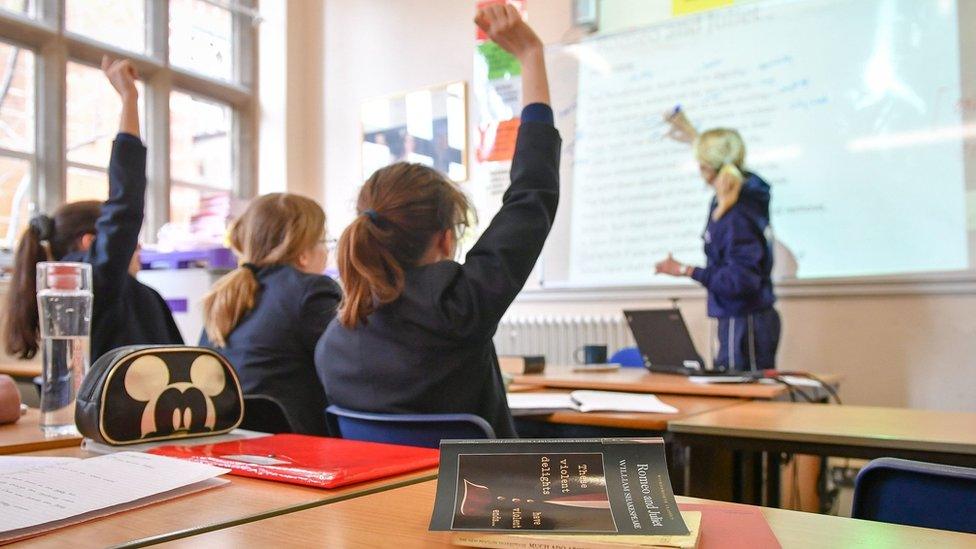Fair employment legislation: Bishop backs ending teacher exemption
- Published

Schools in Northern Ireland are exempt from laws outlawing religious discrimination
The exemption of teachers from fair employment legislation "is no longer appropriate or required," according to a Catholic bishop.
But Bishop Donal McKeown told Stormont there were concerns the move could be used as a "Trojan horse" to remove a Catholic ethos in schools.
He said it was "bizarre" to assume everyone was either Catholic or Protestant in 2022.
NI schools are exempt from laws outlawing religious discrimination.
Previous research from Ulster University (UU) has suggested relatively few Protestant teachers are employed in Catholic schools or Catholic teachers in many controlled schools.
Teaching unions, a number of assembly members (MLAs) and the former first minister Arlene Foster have previously criticised the exemption.
But both Bishop McKeown and the Council for Catholic Maintained Schools (CCMS) told MLAs on Stormont's executive committee that they supported its removal.
The Fair Employment (Northern Ireland) Act in 1976 exempted teachers and clergy as "the essential nature of the job requires it be done by a person holding, or not holding, a particular religious belief".
That was maintained in the Fair Employment and Treatment (Northern Ireland) Order (FETO) 1998.
The exemption allows schools to use religious background or belief in deciding which teachers to recruit, and also means schools have no legal obligation to monitor the community background of their teaching staff.
'Right to promote ethos'
Alliance MLA Chris Lyttle has put forward a private member's bill proposing the exemption is removed.
Both Bishop McKeown, representing the Catholic Schools' Trustee Service, and CCMS chief executive Gerry Campbell told MLAs they supported the removal of the exemption.

Bishop Donal McKeown says the bill must not be "Trojan horse" to affect Catholic schools' ethos
Bishop McKeown claimed "there's never been any suggestion that I know of that a teacher failed to be appointed to a Catholic school because of their religion or political opinion".
"The trustees of Catholic schools and CCMS continue to believe that the values and ethos of a Catholic education are critical to the identity of a Catholic school but we consider that the exemption in the 1998 order is no longer appropriate or required," he said.
"All that legislation at that stage in the 1998 time always worked on the assumption everybody was Catholic or Protestant.
"That's a bizarre assumption for any political decisions in 2022.
"However, the trustees and CCMS will want to have the right to promote our ethos and will want to ensure that the ethos and values of Catholic education continue to permeate those schools.
"We will of course wish to negotiate the post-FETO arrangements but I think we have the right to expect that all teachers understand and are committed to the ethos of the Catholic schools in which they wish to teach."
'Things have moved on'
When questioned by the committee chair, SDLP MLA Sinead McLaughlin, Bishop McKeown said, though, that there was concern the removal of the exemption could be used as "a Trojan horse in order to try to remove any ability of Catholic schools to say they are different in their ethos from other sectors".
"As long as boards of governors are entitled to say 'do you understand the ethos of this school and are you prepared to work within that and support it?' we have no need whatever to say that you appoint someone just because of their perceived religious affiliation," he added.
Bishop McKeown also said some teachers in Catholic schools may continue to need a certificate in Religious Education depending on their role.
DUP MLA Diane Dodds said "we have got to the stage where most people believe the exemption doesn't sit easily with a modern Northern Ireland".
That was echoed by Sinn Féin MLA Pat Sheehan who called it "an anachronism that should be done away with".
But Ulster Unionist MLA John Stewart asked CCMS why teachers applying to be a principal in a Catholic school could be ranked on their commitment to Catholic education?
Patricia Carville, from CCMS, replied that was "under review".

Stormont would have to change the law to remove the exemption of teachers from fair employment legislation
Chief executive of CCMS Gerry Campbell said the world was "a different place than what it was 45 years ago".
"Things have moved on," he said.
"We do believe that the landscape has totally changed, it's a different world we live in now from 1976 and indeed from 1998."
However, the Stormont assembly would have to change the law to remove the exemption of teachers from fair employment legislation.
MLAs are also due to resume debates on a proposed Integrated Education Bill on Thursday.
The bill, brought forward by Alliance MLA Kellie Armstrong, has attracted both support and opposition from schools, MLAs and others.
The Governing Bodies Association, which represents 50 voluntary grammar schools in Northern Ireland, has said it has "serious concerns" about the bill.
"If enacted, this bill will create significant disparities in terms of levels of support, resourcing, training, and funding and lead to unfairness for the majority of our children and young people," they claimed in a statement on Thursday.
- Published26 October 2021
